WASHINGTON, D.C. -- Outside of Zimbabwe, the severity of the economic situation is perhaps hard to fathom, but residents' voices capture the human impact of the country's crisis. Majorities tell Gallup in March 2008 that they went without several basic necessities at least once in the past year.
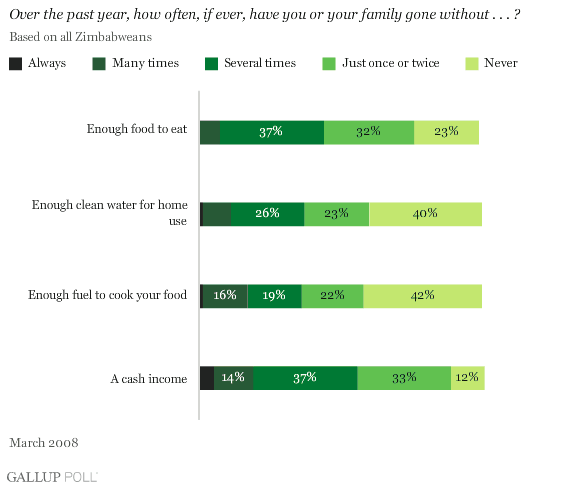
Large percentages of Africans also report similar shortages of such basic necessities due to destruction of infrastructure during times of conflict, natural disasters, poor harvests, or some other reason. But historically Zimbabwe benefited from good agricultural production, mineral wealth, and a well-developed infrastructure.
The country's economic situation, however, has progressively deteriorated, and in 2008, 44% of Zimbabweans say they didn't have enough food to eat at least several times in the past year. As points of comparison with two neighboring countries, 43% of Zambians and 32% of Mozambicans say the same. Thirty-seven percent of Zimbabweans say they, at least several times, lacked enough clean water for home use (versus 45% of Zambians and 31% of Mozambicans).
Thirty-six percent of Zimbabweans also say they had gone without enough cooking fuel at least several times in the past year, which is on par with what Zambians report (35%) but slightly higher than what Mozambicans say (27%). Additionally, 55% of Zimbabweans say they went without a cash income at least several times in the past year, which is similar to what Zambians say (60%) but higher that what Mozambicans report (44%).
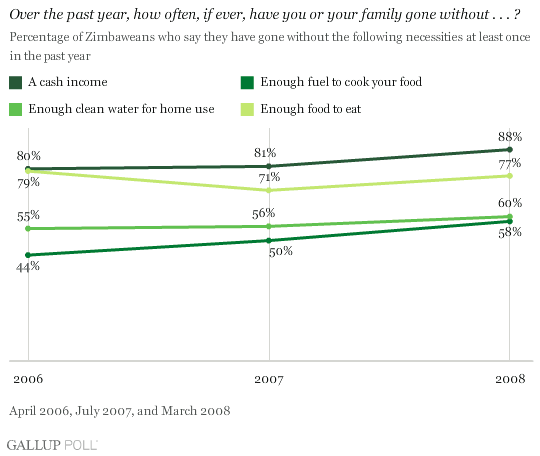
In 2008, Zimbabweans were more likely to report going without basic necessities than they were two years earlier, with the exception of food. The Gallup Poll finds cooking fuel and a cash income becoming the hardest to come by: In 2008, 58% of Zimbabweans said they went without enough cooking fuel in the past year, up from 44% in 2006. Eighty-eight percent say they went without a cash income in the past year, up from 80% in 2006.
Many Zimbabweans also report having gone without electric power. Thirty-four percent of Zimbabweans tell Gallup they have electricity in their home, and out of those, 92% say they went without electricity in their home either many times (49%) or several times (43%).
The High Cost of Hyperinflation
With eight-digit inflation (and prices changing at least daily), Zimbabweans' purchasing power is eroding fast: 84% find living on their present income difficult (45%) or very difficult (39%). Additionally, 13% of respondents tell Gallup they are getting by, and just 2% say they live comfortably on their present income.
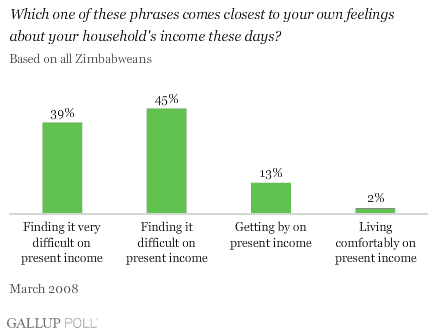
Increasing Reliance on Remittances
Economists point out that in a hyperinflationary environment, where there is great uncertainty about prices every day, people change their consumption behavior. For example, they may purchase goods with just-earned wages for fear of being unable to afford them later, barter goods, or ask relatives living abroad to send them hard currency. In 2008, 40% of Zimbabweans now say they depend on receiving money from family members working in other countries to make a living, up from 26% in 2006.
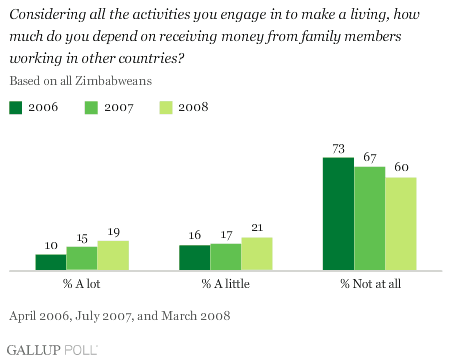
Food Insecurity Challenges
Between 2006 and 2008, more Zimbabweans reported they did not have enough money to buy the food they needed for themselves or their families. Recently, the U.N. Food and Agriculture Organization (FAO) estimated that "2.04 million people in rural and urban areas will be food insecure between July and September 2008, rising to 3.8 million people between October and peaking to about 5.1 million at the height of the hungry season between January and March 2009," or equivalent to 46% of the total population.
Once referred to as the breadbasket of southern Africa, Zimbabwe today must import maize, the country's main food staple, which it used to export. While residents living in rural or urban areas report lacking money to purchase food, in 2008 rural residents (83%) were far more likely than urban residents (69%) to say so.
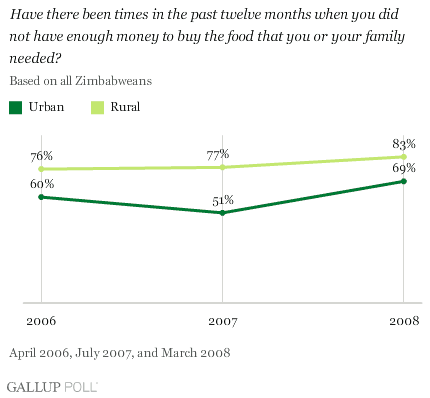
Rural Zimbabweans (79%) are also more likely than urban respondents (69%) to report having gone without enough food to eat in the past year. A cash income has also been more challenging to come by in 2008 for those living in rural areas (92%) than those in urban communities (78%). However, urban Zimbabweans are more likely than their rural counterparts to report being without clean water for home use (90% vs. 50%) and not having enough cooking fuel (83% vs. 49%).
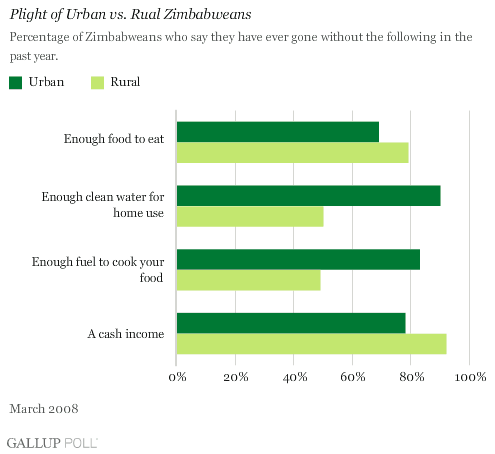
Survey Methods
Results are based on face-to-face interviews with 1,000 adults, aged 15 and older, each year in Zimbabwe in April 2006, July 2007, and March 2008. The 2007 results are based on face-to-face interviews with 1,000 adults in Zimbabwe, aged 15 and older, in June-July 2007. The 2006 results are based on face-to-face interviews with 1,000 adults in Zimbabwe, aged 15 and older, in April 2006. For results based on the total sample of national adults, one can say with 95% confidence that the maximum margin of sampling error is ±5 percentage points.
In Zambia, results are based on face-to-face interviews with 1,000 adults, aged 15 and older, in July 2007. For results based on the total sample of national adults, one can say with 95% confidence that the maximum margin of sampling error is ±5 percentage points.
In Mozambique, results are based on face-to-face interviews with 1,000 adults, aged 15 and older, in July 2007. For results based on the total sample of national adults, one can say with 95% confidence that the maximum margin of sampling error is ±5 percentage points.
In addition to sampling error, question wording and practical difficulties in conducting surveys can introduce error or bias into the findings of public opinion polls.
